U2 B
1/33
There's no tags or description
Looks like no tags are added yet.
Name | Mastery | Learn | Test | Matching | Spaced |
|---|
No study sessions yet.
34 Terms
Anticline
Lesson 2.2.1 Deformation & Metamorphism
A fold arching upward where the older rocks are located in the middle.
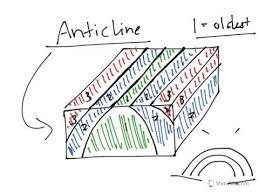
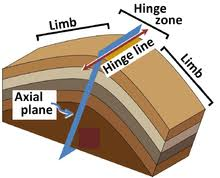
Axial Plane
Lesson 2.2.1 Deformation & Metamorphism
An imaginary surface that passes through all the points of maximum curvature on the fold.
Brittle Deformation
Lesson 2.2.1 Deformation & Metamorphism
When the tectonic stress causes the brittle rock to break.
Ductile Deformation
Lesson 2.2.1 Deformation & Metamorphism
When the tectonic stress causes the ductile rock to bend/fold.
Fault
Lesson 2.2.1 Deformation & Metamorphism
When rock on either side of a fracture ruptures and the two sides move relative to one another. There are three types of faults.
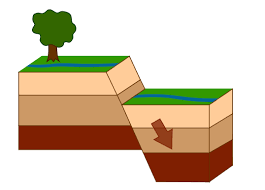
Fold
Lesson 2.2.1 Deformation & Metamorphism
A bend in (plastic) rock as a result of tectonic stress. Usually results from compression. Always shortens the horizontal distances in rock. Usually occurs as part of a group of many similar folds.
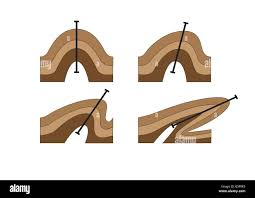
Dome
Lesson 2.2.1 Deformation & Metamorphism
A larger-scale, circular or elliptical anticlinal structure that resembles an upside-down bowl, formed by the rising of continental crust in response to tectonic forces.
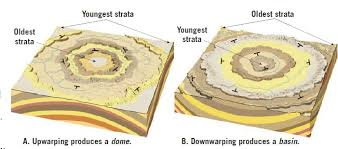
Basin
Lesson 2.2.1 Deformation & Metamorphism
A larger-scale, circular or elliptical synclinal structure that resembles an rightside up bowl, formed by the sinking of continental crust in response to tectonic forces.
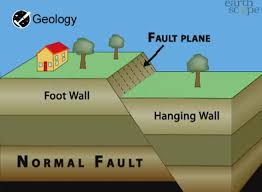
Normal Fault
Lesson 2.2.1 Deformation & Metamorphism
Forms where tectonic forces cause Earth’s crust to stretch, pulling it apart and causing normal faults to form. The hanging wall slips downward against the footwall. The distance between point A and point B grows.
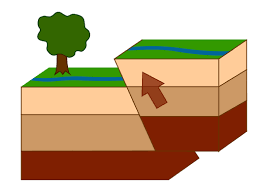
Reverse Fault
Lesson 2.2.1 Deformation & Metamorphism
Produced by horizontal compressive forces in which the hanging wall moves upward relative to the footwall. The distance between point A and point B shortens.
Syncline
Lesson 2.2.1 Deformation & Metamorphism
A fold arching downward.
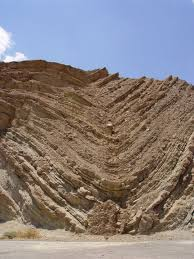
Earthquake
Lesson 2.2.2 Earthquakes
Vibration of a rock as a result of stress build-up along the plate boundary stored in the rock as energy. When the stress goes over the threshold, it causes the rock to suddenly break, it releases the stored energy causing rock on one side of the break to lurch violently past rock on the other.
Epicenter
Lesson 2.2.2 Earthquakes
The point on Earth’s surface directly above the focus.
Focus
Lesson 2.2.2 Earthquakes
The initial rupture point, where abrupt movement creates an earthquake, typically lies below the surface.
Seismograph
Lesson 2.2.2 Earthquakes
A device that records seismic waves.
Mercalli
Lesson 2.2.2 Earthquakes
Measures the intensity of an earthquake based on structural damage.
Richter
Lesson 2.2.2 Earthquakes
Calculated using the height of the largest earthquake body wave recorded. It is more quantitative but it is not a precise measure of earthquake energy.
Rupture
Lesson 2.2.2 Earthquakes
A massive displacement of rock that can lead to large earthquakes and tsunamis.
Magnitude
Lesson 2.2.2 Earthquakes
The strength of an earthquake; can be calculated using different scaled (i.e. Richter or Mercalli).
Triangulation
Lesson 2.2.2 Earthquakes
A method used to determine the location of an earthquake using P wave and S wave arrival time.
Liquefaction
Lesson 2.2.2 Earthquakes
Subsidence of the land surface and causes objects to collapse into the slurry of water and sediment.
Surface Waves
Lesson 2.2.2 Earthquakes
Radiate from the epicenter and travel along the Earth’s surface. They are the most destructive.
Eruption
Lesson 2.2.3 Volcanos
The upsurging of magma from a volcano.
Lahars
Lesson 2.2.3 Volcanos
Volcanic mudflows that flow outward from the mountain. Resemble a river of wet cement, varies in speed depending on the amount of water and the size of the debris, and it can be impossible to outrun.
Lava flow
Lesson 2.2.3 Volcanos
The least dangerous volcanic hazard because lava flows are not very fast. However, lava is very hot and burns everything in its path.
Volcano
Lesson 2.2.3 Volcanos
A cone-shaped hill or mountain created by the eruption of magma in the form of lava, tephra, and other debris.
Composite Volcano
Lesson 2.2.3 Volcanos
Composite cones are large volcanoes generally composed of lava flows, pyroclastic deposits, and mudflow (lahar) deposits, as well as lava domes. They are the most deadly.
Shield Volcano
Lesson 2.2.3 Volcanos
A gently sloping and enormous mountain made up of fluid basaltic magma. Eruptions are normally gentle and rarely life threatening.
Supervolcano
Lesson 2.2.3 Volcanos
An extremely deadly volcano; Yellowstone.
Tephra
Lesson 2.2.3 Volcanos
the most far-flung product of a volcanic eruption. It can be blasted more than 20km into the atmosphere and carried much farther downwind.
Tsunami
Lesson 2.2.3 Volcanos
Sea waves produced by an earthquake occuring beneath the sea. May travel at 750 km per hour
Stratovolcano/Composite Cone
Lesson 2.2.3 Volcanos
Forms over a long period of time as a sequence of lava flows and pyroclastic eruptions. The hard lava covers the loose pyroclastic material and protects it from erosion.
Pyroclastic Flow
Lesson 2.2.3 Volcanos
fast-moving hot clouds of toxic gases mixed with tephra that tumble down volcanic slopes.
Cinder Cone
a small volcano composed of pyroclastic fragments. Forms when large volumes of gas acculumate in rising magma, leading to explosive eruptions that hurls cinders, ash, and molten magma into the air until they fall back to accumulate as a small mountain.